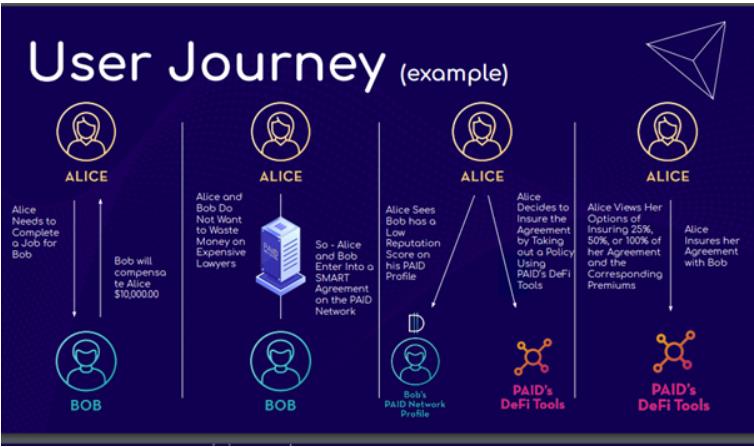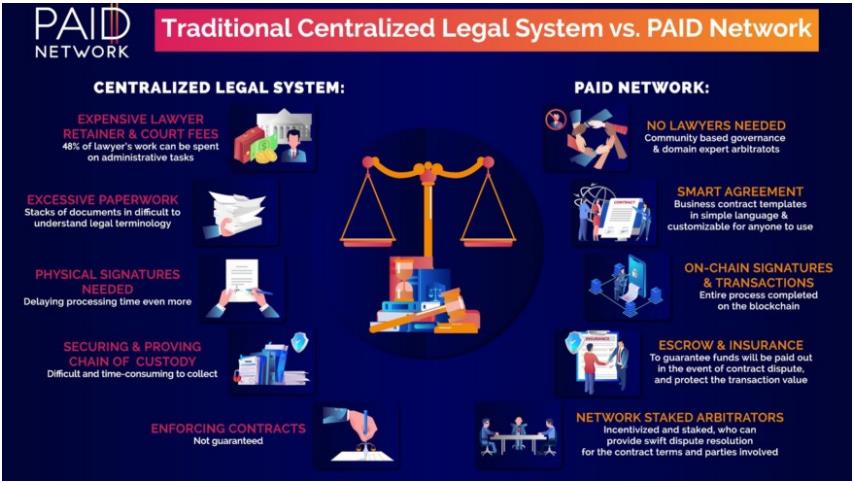PAID is a decentralized protocol that will allow users to do business with anyone, anywhere in the world, without spending much on legal services. To achieve this goal, the platform will offer a web as well as mobile applications to its users.
PAID’s platform will use SMART agreement templates, where users can fill in the terms and conditions and execute business contracts with other people using their desktop or mobile phone.
The PAID Network will also introduce a suite of new DeFi tools that will provide facilities regarding staking, insurance, and escrow. Users can use these applications provided by the PAID platform in making and completing an end-to-end business agreement.
The PAID platform will also offer a marketplace that will allow any business or business professional to post offers or requests for various types of business agreements.
Once the community members receive an interest in an offer, they negotiate and finalize the agreement. To track the risk associated with financial services, the platform will also bring a reputation-based scoring system. The scoring system will be publicly available and be comprised of a peer-to-peer rating and comment system where users can submit their feedback. If any company receives bad user feedback, the community of fundraising participants can intervene and request a vote to cease the release of funds.
And if the vote to cease funding passes, the remaining funds will be distributed back to these participants proportionally, according to the percentage of their original investment.
PAID Token
The PAID token is the native governance token of the PAID Network. The token has multiple utilities. The project will use the PAID token for the services provided by the platform. The services include creating smart agreements, purchasing and providing insurance coverage, borrowing/lending escrow, dispute resolution, and DAICO participation. PAID can be “staked” (i.e., locked up) within protocol smart contracts, giving access to varying levels of features and staking returns across the platform.
The initial supply of PAID is 19,884,000, and the total supply of PAID will be 594,717,456. The total supply will decrease over time due to token burns.
Features
- Removes the complexity of creating and executing documents.
- Help in doing borderless business agreements.
- PAID community members will govern any dispute in the agreement.
- No need to have third party legal services, lawyer, or legal counsel.
- Less expensive.
- Contains only deliverables, less complex.
- Easy to understand.
- On-chain signatures and transactions.
- Escrow and insurance.
- Simple and customizable smart agreements.
Traditional Legal System vs. PAID Network
The PAID Network aims to address the issues existing in our current legal system.
Key Components of PAID Network
Below are the key components of the PAID ecosystem.
SMART Agreements are the core of the PAID network. These are the contract templates that contain the deliverables required for the business agreements.
The agreements are accessible via PAID apps and will be available for most legal scenarios.
The PAID community members arbitrate and resolve any dispute relating to the SMART Agreements. The arbitrators are those who have a significant stake in the PAID platform. They collect a fee for each dispute arbitrated and are responsible for maintaining the integrity of the system.
PAID maintains an on-chain reputation scoring system by using decentralized identifiers (DID) for its users. When the user creates a PAID profile and verifies their identity, they will be assigned a reputation score starting at zero. This reputation score will increase or decrease based on feedback from people with whom they do business. Users need to go through biometric authentication to ensure their identity in the reputation system. The project will identify and block duplicate biometric signatures from creating new profiles.
To protect funds, parties entering into agreements on PAID can use an escrow service. This escrow can be funded by the parties involved in the agreement or could be borrowed from token holders within the PAID ecosystem.
Escrow funding requirements are based on the reputation score of the borrower. The lender sets the APY and can also ask for collateral on the loan if they wish to decrease their risk.
Escrow borrowing and lending will take place via a decentralized P2P marketplace within the PAID platform. The escrow borrowing/lending services also support invoice factoring using, which individuals or companies can do business through the P2P DeFi marketplace.
Beneficiaries can use PAID’s decentralized insurance pool mechanism to ensure their payments. Stakers can participate in these insurance pools by investing their capital into the pool and receive premium payments in return.
DAICO is a fundraising platform of PAID that launches the project. The PAID community monitors the project’s progress and releases funds in tranches.
The funds are generally locked in a smart contract and distributed to the project according to the scheduled fund release plan.
If any of the project fundraising community members notice any flaw in the project progress, they can call for a project audit at any time by submitting an audit request to PAID DAICO community arbitrators. Upon approval of the audit, the project funds will be locked via a smart contract-based vote. The company will only receive additional funds after completion of the audit.
If the progress seems satisfactory, then the funds will be unlocked and the project will receive the allotted funds based on the release schedule. If the project fails the audit, a solution will be determined by a community vote.
The PAID Governance team is comprised of the PAID token holders and stakers. Using the governance system, the members can submit proposals that would be voted on by other stakeholders within PAID.
Social Presence
Conclusion
PAID Network aims to address the issues faced with the current legal system that is quite complex, time-consuming, and expensive. The platform’s Smart Agreement template is written in simple language to be understood by everyone. Being powered by blockchain, the platform, by default, comes up with basic features like decentralization. It allows users to do business across the world without worrying about the legal complications of different countries.
Resources: PAID Network whitepaper
Read More: Bondly Finance – How To Stake the BONDLY Liquidity Pool


